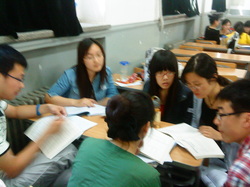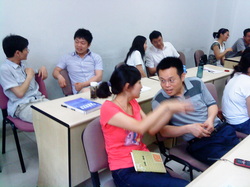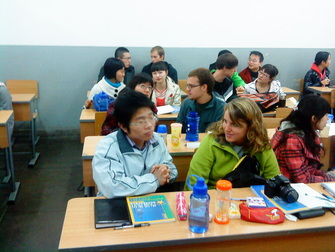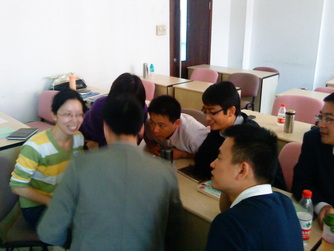Practicing English together with a group

Find a group of friends who want to improve their English. This should be easy in China. Set a time every week to talk together in English. Click here for ideas on starting an discussion group.
There are no shortcuts to becoming an excellent English communicator. English is not only a subject we study in school. It's a skill. Like any skill, improvement never comes without practice. Nobody becomes a good soccer player without actually playing soccer. Likewise, nobody becomes good at speaking English without actually speaking English. Studying English won't make you better at speaking any more than studying soccer books will improve your ability to play soccer. Study is necessary, but without actually using what you study, it will die. You have to open your mouth and speak.
|
You want to improve your English. Click the area you would like look at for improving.
Reading Listening Grammar Practicing English together with a partner

Sometimes it's easier to speak with other Chinese. As a friend to be your partner and spend time every week talking together in English.
Everybody has methods that work best for them. Never be afraid to try new methods. If you have been using the same methods for several years and feel your English is not improving, maybe the problem is not "poor English." Maybe the reason your English is not improving is that you have been using a method that is not effective for you. What works for one person doesn't always work for another person. You can practice English with a partner, in a group, with native English speakers or with other Chinese. You can even talk to yourself. Try one method for a while and then change to another. Keep trying until your English communication feels natural.
|
CAMPUS ENGLISH
Students in China spend many years memorizing thousands of English vocabulary words for exams, but their long vocabulary lists may not include the most important and useful words. That's one of the reasons Chinese students, after scoring high on exams, still find it difficult to communicate when they go abroad or chat with native English speakers in China. The problem is they haven't yet learned the words WE native English speakers use most often. So the question is this; Which words are the most useful?
There are lots of opinions about which words to begin with, but I'd like to suggest you first learn to describe what you see every day. If you are a student, this means where ever you go on campus, you should be able to describe everything you see. You may have learned 10,000 English words, but if you don't know what to call the things in front of your eyes, your English is not as great as you think. In this section we'll look at some examples of things seen on campus. As you walk around your campus, you'll see things that are not pictured here. If you see them often, learn the English words for them. Get in the habit of looking around campus and making sure you can use English to describe everything you see.
There are lots of opinions about which words to begin with, but I'd like to suggest you first learn to describe what you see every day. If you are a student, this means where ever you go on campus, you should be able to describe everything you see. You may have learned 10,000 English words, but if you don't know what to call the things in front of your eyes, your English is not as great as you think. In this section we'll look at some examples of things seen on campus. As you walk around your campus, you'll see things that are not pictured here. If you see them often, learn the English words for them. Get in the habit of looking around campus and making sure you can use English to describe everything you see.
|
Many campuses have beautiful ponds. A pond is a very small body of water, much smaller than a lake. Some ponds, like the one pictured on the right, include fountains.
Some of the things you see on campus are for traffic control. For example, to prevent people from driving dangerously fast, there are speed bumps on some streets. But other roads don't need speed bumps because holes in the road called pot holes make it difficult to drive fast. Campuses use barricades and pylons to keep cars out of certain areas. One of the easiest ways to avoid the difficulties of driving is walk, ride a bike, or a scooter. A scooter is a kind of motor bike, but smaller than a motor cycle. If it rains, you don't have to worry about deep water on the streets because most campuses have storm drains so the water can easily flow off the road. One more thing to remember; If you drive a car on campus, you can avoid expensive hourly parking fees by buying a parking permit. Biking is my favorite way to get around campus. The campus where I live and work has plenty of bike racks for parking bikes. There are lots of things to see and do while riding or walking around campus. If I'm thirsty, I can buy a soft drink from a vending machine. On my campus, there's a vending machine right outside the gymnasium, convenient for people who are thirsty after participating in sports events. One of the more embarrassing things seen, especially in the campus parks at night, is couples making out. In many countries, making out in public would likely get the attention of the campus police. Where ever these couples go, they are sure to be spotted by surveillance cameras, unless they are hiding under the roof of a pagoda. |
One of the most common English mistakes made by Chinese is the translation of the word 门. When used to describe something that opens and closes for entering and exiting a room or a building is a door. Most students don't have a problem with this, but often the word gate is used incorrectly. Every day I hear people say things like; "Meet me at the west gate." "My dorm is near the main gate." "Our school has two north gates." Sometimes gate is correct, but not always.
The place where we enter a campus is called the entrance. Most native English speakers living in China have gotten used to hearing the word "gate" and do not tell Chinese friends it is not correct. One of the reasons for this is that most entrances also have a gate. The place we enter is an entrance, but sometimes at night they guards will close the gate. The gate is not a place, but it is the "thing" at the entrance that can be closed. |


